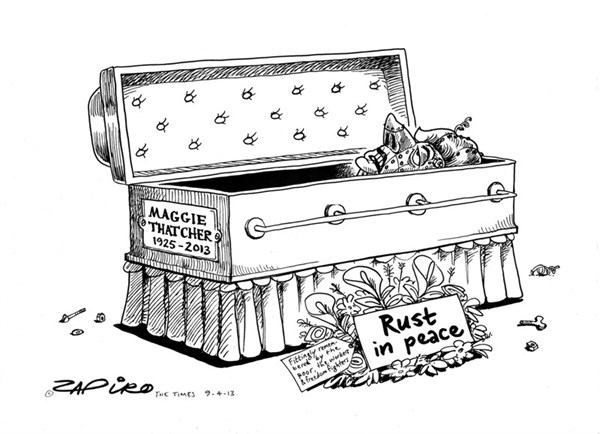
You probably don't know anything about Margaret Thatcher, former prime minister of the United Kingdom, who passed away yesterday. But the influence of the policies she put into practice on our current lives is so strong that you may be interested in learning a little about her.
Margaret Thatcher was the first (and only for the moment) woman who became prime minister in the UK. She belonged to the Conservative Party and, together with Ronald Reagan in the USA, launched what has been called the "conservative revolution": a series of economic decisions with the purpose of reducing the Welfare State benefits, privatizing public companies, deregulating the financial system and reducing the workers' rights. In fact, these policies meant a regression of the standards of living of most of the population, which had constantly increased since the end of WW2, and the increase of the differences of wealth between workers and the richer people. Margaret Thatcher's governments also opposed to a bigger integration in the European Union and followed a die-hard policy against the labour movement and Northern Ireland independentists. The Falklands (Malvinas) War against Argentina gave her a lot of popularity and contributed to her re-election in 1983. The economic recovery contributed to increase her popular support in the United Kingdom and she won the elections again in 1987, but in 1990 she was forced to leave the government when she lost the support of her own party. Her strong-willed and stubborn personality contributed to the extension of the nickname "Iron Lady" to refer to Thatcher. She was also called "the milk snatcher", because when she was secretary of Education between 1970 and 1974 she decided to eliminate free milk for children in schools in order to cut expenses.
It is said that Margaret Thatcher was either loved or hated. In several parts of the UK there have been celebrations for Thatcher's death, especially in the places that suffered the consequences of her policies: Scotland, Northern Ireland, former industrial cities, such as Liverpool, and some London suburbs, like Brixton:
There are several British films which show the consequences of Thatcher's policies in the UK; such as The Full Monty (industrial reconversion) , Brassed off , Billy Elliott (mines' closures) or The Navigators (privatization of railway lines).
If you want to learn more about Margaret Thatcher, here you have the link to the BBC special report about her:
And this is a survey about her policies made by The Guardian :

Source: http://blogs.post-gazette.com/index.php/opinion/rob-rogers-cartoons

Source: http://thecontributor.com/humor/six-political-cartoons-refuse-sugar-coat-thatchers-legacy

Source: http://thecontributor.com/humor/six-political-cartoons-refuse-sugar-coat-thatchers-legacy
No comments:
Post a Comment